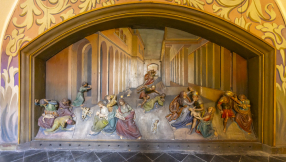MPs concerned over future of religious education
In a Westminster debate yesterday, Tory MP Fiona Bruce warned that leaving RE out of the baccalaureate could have “unintended consequences”.
She pointed to research by the National Association of Teachers of Religious Education which found that one in three schools is planning to significantly reduce the number of RE teachers and resources committed to the subject.
With cuts already being made in university teacher training places for RE, Bruce expressed concern over the prospect of the subject being taught by non-specialist teachers.
“The teaching of RE in schools risks being undermined,” she said.
She continued: “Religious issues are frequently top of any news agenda. Today’s RE helps young people make sense of that and wider world affairs.
“It also promotes community cohesion, as it allows young people, who are growing up in a diverse society, to discuss and understand the views and opinions of people whose beliefs and values differ from their own, in the safety of the classroom environment.”
She warned that some schools might stop offering GCSE RE altogether as a separate subject in order to raise or maintain their school ranking by prioritising E-bac subjects.
She also fears that students who devote time to studying GCSE RE will be penalised because it does not qualify as an E-bac subject.
Labour MP Catherine McKinnell said she had been contacted by many concerned constituents and local schools and educationalists.
She said that RE should not be “downgraded”, arguing that a good understanding of all religions was “essential” to a well-rounded education.
“I share my constituents’ concerns,” she said.
“We seriously lag behind the rest of Europe in our approach to education and our ability, through our schooling, to analyse issues and problems from a deeper philosophical perspective.
“I am concerned that the decision to exclude RE from the E-bac will reinforce that trend, when a better understanding and respect for different faiths, regardless of one’s own faith or practice, would be beneficial.”
Labour MP Siobhain McDonagh rejected criticism of RE as “wishy washy” subject, saying that it provided people with an understanding of their place in society and the views of others.
Gove has stated that the decision to omit RE was made only out of a desire to reverse declining interest in history and geography.
McDonagh argued that RE would face a similar decline if it was left out of the E-bac.
She also argued that RE was necessary to help counter radicalism.
“Sometimes the religious education that young people receive outside the classroom may be a cause for concern, and for radicalism, but that may be challenged in schools in an environment where people feel safe to challenge the views of others,” she said.
The debate came as the pro-RE campaign, RE.ACT, handed over a petition to Downing Street with 115,000 signatures calling upon Gove to reconsider his decision by including RE alongside history and geography as one of the humanities options.
More than 100 MPs have signed an early day motion tabled by Stephen Lloyd making a similar call.













